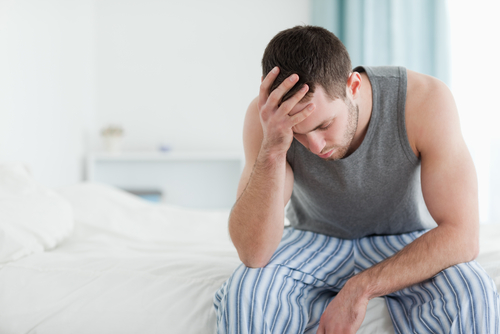What is health anxiety?
Health anxiety is an irrational worry about having an illness. Those affected by health anxiety have an obsessional preoccupation with the idea that they are currently (or will be) experiencing an illness.
They might spend hours on the Internet researching health information. When they get a sore throat, they automatically think it could be something serious like throat cancer and dismiss the fact that it is probably the start of a cold. Even when GP tests come back negative, it only gives temporary relief before the anxiety about another symptom starts again.
Although some people refuse to be examined by their doctors out of fear of discovering the worst. Others constantly seek reassurance from their GP, insisting on repeated medical tests. Visits to the A&E are also common in health anxiety. However, once seen the vicious cycle quickly resumes as new thoughts and physical sensation surface. Followed by more interpretations and more visits to doctors to try and find certainty that there is nothing wrong.
What’s the difference between concern for your health and health anxiety?
If your body is sending you signs that you’re ill, it’s normal to be concerned. Health anxiety is marked by constant belief that you have a symptom or symptoms of a severe illness. You may become so consumed by worry that the distress becomes debilitating.
The tell-tale signs of health anxiety
You have no symptoms, but still fear that you are ill.
You misinterpret normal body sensations as serious illness despite reassurance by medical professionals that there is nothing wrong
When a doctor reassures you that you don’t have an illness or a test shows you’re healthy, it doesn’t relieve your fear
You find yourself constantly ‘Googling’ health information.
If you read a news story about a disease, you start worrying that you have it.
Your worries about your health are interfering with your life, family, work, or hobbies and activities.
The False Alarm
Let’s use the analogy of car alarms. A car alarm is usually set off when a criminal breaks in. However, imagine how problematic it would be if the alarm blared every time a pedestrian walked by. The car alarm would be misinterpreting innocent people as dangerous criminals.
With health anxiety it is the misinterpretation of discomfort or normal bodily sensations that are viewed as dangerous. The human body is noisy and healthy human bodies produce all sorts of physical symptoms that might be uncomfortable, unexpected, and unwanted perhaps, but not dangerous.
In somebody who experiences health anxiety. Normal bodily sensations produce fear and worry which can include blurred vision, increased heart rate, shallow breathing, dizziness and stomach and digestive problems. These are normal and harmless bodily changes, but when a person believes they are symptoms of a terrible disease, it causes anxiety. The sensations are real, but the beliefs are false.
Why do people misinterpret natural bodily sensations?
Sometimes misinterpretation is due to assumptions about an illness. For example, “my cousin died of cancer, it’s only a matter of time until I get it.” Or interpret any ache as the possibility of a stroke or a heart attack. People with health anxiety might hold rigid definitions of good health, perhaps believing that any discomfort whatsoever means bad health.
Anxiety is a primal mechanism leading to an urge to protect yourself from harm. Scanning the body for an illness seems like the right thing to do to defend ourselves. However, when we are preoccupied with looking for symptoms, it leads to you notice subtle sensations that you might otherwise ignore. Therefore, when you become fixated on bodily sensations, those sensations become amplified and last longer.
How can counselling and CBT help?
Our therapists will help you think through where you feel your health anxiety may have begun. This is used more as a point of interest and understanding. They will then use the tools of cognitive behavioural therapy (CBT) to help you move forward and overcome your anxiety about your health.
CBT is not about encouraging you to ‘like’ the idea of being ill or to be ‘happy’ about any uncomfortable bodily sensations that you don’t happen to like. It’s about helping you understand the importance of being logical and rational and looking at fact rather than interpretation. Additionally, it’s about learning to understand – that even we don’t necessarily ‘like’ a situation, we are still able to tolerate it.
CBT helps you identify and challenge any unhealthy beliefs you may hold whilst helping you identify and reinforce a series of much more helpful and rational beliefs. By challenging your beliefs, you can change the way you think, feel and act.
If you would like to make an appointment to see one of our therapists for help with overcoming health anxiety – click here to make an appointment – Request an appointment
Suggested self-help books
Overcoming Health Anxiety: Letting Go of Your Fear of Illness http://bit.ly/Overcominghealthanxiety
Anxiety: Panicking about Panic: http://bit.ly/AnxietySelfHelp


